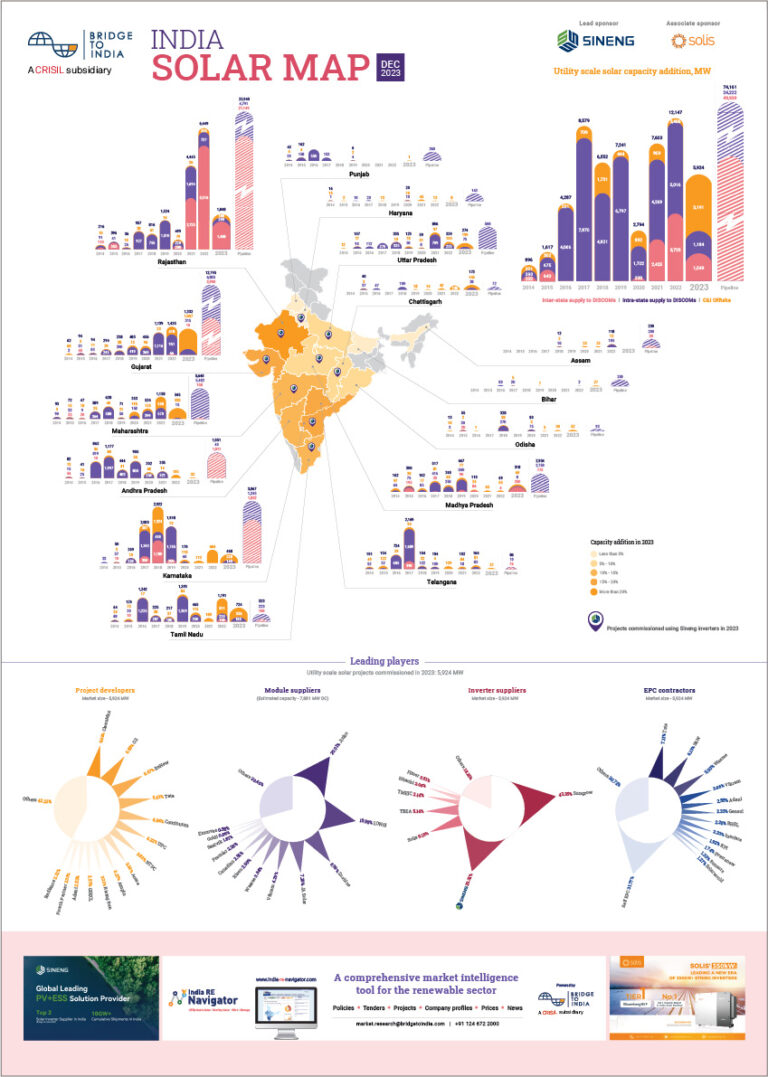Karnataka has announced a second round of allocations under its state solar policy. In the last round that took place one year ago, 80 MW was allocated (refer).
- Allocations of 130 MW of PV as well as CSP projects are targeted
- The policy aims to meet the RPOs of distribution companies, and makes no attempt to put forward more ambitious targets like in other states
- The state has opted for a reverse auction based on a benchmark tariff of INR 14.50/kWh for PV and 11.35/kWh for CSP
The new bidding process aims to allocate a capacity of 130MW (refer to the PPA and Request for Proposal (RfP) documents). The pre-bid meeting will take place on 12th March 2013 and the bid submission due date is 28th March 2013.
In the first round, 50 MW was reserved for PV and 30 MW for CSP. However, since proposals for just 20 MW of CSP came in, the remaining 10 MW had been transferred to PV. This time round, no demarcation has been made for PV and CSP. Given that the maximum size of a single project is 10 MW as per the RfP document, it is unlikely that any developer will bid for CSP. The minimum size for a single project is 3 MW.
The primary aim of these allocations is to meet the Renewable Purchase Obligation (RPO) of the state’s power distribution companies. No attempt has been made to deviate from this limited objective and put forward more ambitious targets like other states such as Gujarat, Andhra Pradesh and Tamil Nadu have done. The bidding process in Karnataka is similar to its previous allocations as well as to phase one of the National Solar Mission (NSM): a reverse auction, based on a (rather surprising) benchmark tariff of INR 14.50/kWh for PV and 11.35/kWh for CSP. Unlike other new policies in Tamil Nadu, Andhra Pradesh and Rajasthan, the state has not opted for the L1 process, wherein developers are asked to meet the lowest bid.
Stability in Karnataka might be considered a good thing on the face of it. However, solar is a new market and the regulatory environment has been evolving constantly over the last two years, with plenty of opportunity to learn from different policies.
For example, Gujarat came out with the concept of solar parks. Solar parks help developers streamline the development process. Andhra Pradesh became the first state to waive open access, wheeling and other grid-related charges, thereby opening up the markets for direct third party power sales (refer). Tamil Nadu pioneered Solar Purchase Obligations (SPOs), effectively shifting the cost of solar from debt-ridden power distribution companies to large power consumers (refer). Both Kerala and Tamil Nadu are planning to offer net-metering, which can open up the immense potential of the residential market. India is currently a great laboratory for solar policies (refer), with a key focus on ensuring bankability (refer). To stand still in such a dynamic market means losing out on opportunities to deliver more solar power more rapidly to more consumers at lower rates.
Jasmeet Khurana works on project performance benchmarking, success factors for module sales, financing and bankability of projects in India.
This post is an excerpt from this week’s INDIA SOLAR WEEKLY MARKET UPDATE. Sign up to our mailing list to receive these updates every week.
You can view our archive of INDIA SOLAR WEEKLY MARKET UPDATES here.
What are your thoughts? Leave a comment below.












